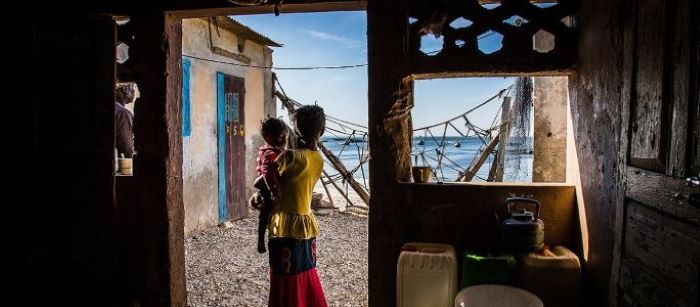Blog |
Coronavirus Makes Investing in Climate Adaptation more Urgent than ever
The COVID-19 pandemic has laid bare the importance of planning for crises before they hit.
The COVID-19 pandemic has laid bare the importance of planning for crises before they hit, as well as the destructive potential of unmanaged risk. But during this unprecedented crisis, climate shocks and extreme weather events will not stop. All countries – but particularly the poorest and most vulnerable – now face the compound impacts of climate and COVID, as we saw during Cyclone Amphan, where authorities in Bangladesh and India had to handle competing goals of evacuation and lockdown to keep communities safe. As countries begin the process of recovery, it is critical that we focus on building climate resilience, anticipating future risks, reducing vulnerability, and boosting shared prosperity.
“No-regrets” investments for development and resilience
A wide range of tried and tested investments can boost job creation, improve incomes, and generate climate resilience for communities. We call them “no-regrets” investments because they make sense in development terms and generate wins whether or not a specific climate threat materializes in the future.
For instance, in the short term:
- Strengthening early warning – early action systems, for example through the World Bank’s West Africa Regional Hydromet Services Program. This is investing $100 million to strengthen climate information services in Chad, Mali and Togo, to help communities anticipate climate-related disasters and other future climate threats before they hit, reducing the cost of recovery. Evidence shows that just 24 hours’ warning of a coming storm or heat wave can cut the ensuing damage by 30 percent, avoiding losses of as much as $16 billion per year in developing countries.
- Climate-smart agricultural investments, for instance through the distribution of seasonally appropriate drought or flood-resilient seeds, crop diversification, and inter-cropping systems. These can be combined with policy incentives that bolster local production in the coming months to help hard-hit farmers and boost their adaptive capacity.
Investments with medium- to longer-term considerations could include:
- Boosting coastal resilience. The Bank’s West Africa Coastal Areas Management program is helping countries combat coastal erosion and rising sea levels through beach nourishment, replanting of mangroves, and relocation of populations where coastlines are vanishing. As part of increasing coastal resilience, mangroves can provide greater protection during extreme weather and offer ecosystem services such as biodiversity, fisheries, pollution control, and carbon storage. In India, a World Bank project has mapped the entire coastline to better manage coastal space and protect the shoreline. So far more than 1.7 million people have benefited, and 16,500 mangroves have been planted.
- Boosting urban resilience. For instance, in Senegal, the Saint-Louis Emergency Recovery and Resilience Project is helping the vulnerable city deliver services and address multiple development risks stemming from sea-level rise and urban sprawl.
- Creating incentives for institutional coordination. For instance, through development policy finance focused on recovery, the Bank can help countries link early knowledge of climate impacts with early action and preparedness at the sector level, as well as boost coordination among ministries of health, agriculture, water, public works and transport.
From project-level to system change: Building blocks for climate resilient recovery
Here are four core building blocks that can help countries move from ad hoc responses to building system-level resilience:
First, make the case: Countries need political consensus on core adaptation and resilience policies. Building long-term resilience is seldom seen as a priority, least of all during a pandemic. But there is a wealth of evidence to demonstrate that doing so is a smart investment. Highlighting the business case for adaptation could help convince finance and planning ministers to include climate-resilience financing as part of regular development planning. For instance, investing $1.8 trillion globally in five areas from 2020 to 2030 could generate $7.1 trillion in total net benefits. Solutions to improve the resilience of infrastructure exist, and investments in this are both sound and profitable.
Second, develop the plan: Most developing countries do not have adaptation investment plans that outline their needs in the short, medium, or long term. The past decade of National Adaptation Plans of Action and more recent National Adaptation Plans have gotten as far as defining the adaptation priorities of countries. However, to advance action, a portfolio of investment-ready priority adaptation projects is critical. These can also help unlock much-needed private investment as public budgets will be constrained by urgent spending on health care and social programs.
Third, foster an inclusive process: The climate crisis may feel global, but its impacts are deeply local. Bringing grassroots movements into the process of prioritizing and designing climate resilience investments is an important ingredient for success. The Bank has pioneered community-driven development initiatives, an approach that holds enormous promise. Working with local organizations that can mobilize communities and ensure that their people’s voices are heard in the design and implementation of projects can go a long way in giving agency to climate-vulnerable populations and helping them achieve longer-term resilience.
Fourth, think outside the silo: Individuals don’t experience adaptation or resilience as a single activity, but rather through a range of actions that cut across responses and sectors. Similarly, boosting adaptation and resilience at a national level will transcend line ministries and single actors. Rather, it is about implementing a culture of early warning, early action, and preparedness across all sectors of a country’s economy. Policies and investment plans will need to break sectoral silos to help countries face multi-sectoral, and often transboundary adaptation challenges.
COVID-19 is teaching us the importance of understanding who is vulnerable and why: it’s reiterating the need for equal access to services and basic rights, risk-informed decision making in the face of uncertainty, and precautionary action. These are also the cornerstones of preparedness for the climate crisis. If we rise to the challenge and fully embrace these lessons, we can reduce the multiple impacts of this crisis and lay the foundations for facing the next one.
Author: Arame Tall, Senior Adaptation and Resilience Specialist, Climate Change Group, World Bank

